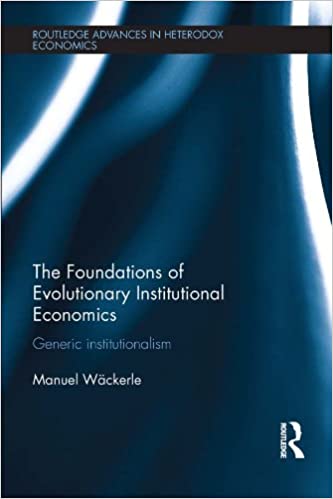Generic institutionalism offers a new perspective on institutional economic change within an evolutionary framework. The institutional landscape shapes the social fabric and economic organization in manifold ways. The book elaborates on the ubiquity of such institutional forms with regards to their emergence, durability and exit in social agency-structure relations. Thereby institutions are considered as social learning environments changing the knowledge base of the economy along generic rule-sets in non-nomological ways from within.
Specific attention is given to a theoretical structuring of the topic in ontology, heuristics and methodology. Part I introduces a generic naturalistic ontology by comparing prevalent ontological claims in evolutionary economics and preparing them for a broader pluralist and interdisciplinary discourse. Part II reconsiders these ontological claims and confronts it with prevalent heuristics, conceptualizations and projections of institutional change. In this respect the book revisits the institutional economic thought of Thorstein Veblen, Friedrich August von Hayek, Joseph Alois Schumpeter and Pierre Bourdieu. A synthesis is suggested in an application of the generic rule-based approach. Part III discusses the implementation of rule-based bottom-up models of institutional change and provides a basic prototype agent-based computational simulation. The evolution of power relations plays an important role in the programming of real-life communication networks. This notion characterizes the discussed policy realms (Part IV) of ecological and financial sustainability as tremendously complex areas of institutional change in political economy, leading to the concluding topic of democracy in practice.
The novelty of this approach is given by its modular theoretical structure. It turns out that institutional change is carried substantially by affective social orders in contrast to rational orders as communicated in orthodox economic realms. The characteristics of affective orders are derived theoretically from intersections between ontology and heuristics, where interdependencies between instinct, cognition, rationality, reason, social practice, habit, routine or disposition are essential for the embodiment of knowledge. This kind of research indicates new generic directions to study social learning in particular and institutional evolution in general.
چکیده فارسی
نهادگرایی عمومی دیدگاه جدیدی را در مورد تغییرات اقتصادی نهادی در چارچوبی تکاملی ارائه میکند. چشم انداز نهادی ساختار اجتماعی و سازمان اقتصادی را به طرق مختلف شکل می دهد. این کتاب در مورد فراگیر بودن این گونه اشکال نهادی با توجه به ظهور، دوام و خروج آنها در روابط کارگزاری-ساختار اجتماعی توضیح می دهد. بنابراین مؤسسات بهعنوان محیطهای یادگیری اجتماعی در نظر گرفته میشوند که پایگاه دانش اقتصاد را در امتداد مجموعههای قواعد عمومی به روشهای غیر نامشناختی از درون تغییر میدهند.
توجه خاصی به ساختار نظری موضوع در هستی شناسی، اکتشافی و روش شناسی داده شده است. بخش اول با مقایسه ادعاهای هستیشناختی رایج در اقتصاد تکاملی و آمادهسازی آنها برای گفتمان کثرتگرایانه و بینرشتهای گستردهتر، یک هستیشناسی طبیعی کلی را معرفی میکند. بخش دوم این ادعاهای هستیشناختی را بازنگری میکند و آن را با اکتشافیها، مفهومسازیها و پیشبینیهای رایج تغییرات نهادی مواجه میکند. در این رابطه، کتاب به بازبینی اندیشه اقتصادی نهادی تورشتاین وبلن، فردریش آگوست فون هایک، جوزف آلویس شومپیتر و پیر بوردیو می پردازد. یک سنتز در کاربرد رویکرد مبتنی بر قانون عمومی پیشنهاد شده است. بخش سوم پیادهسازی مدلهای تغییر نهادی مبتنی بر قانون را مورد بحث قرار میدهد و یک نمونه اولیه شبیهسازی محاسباتی مبتنی بر عامل ارائه میدهد. تکامل روابط قدرت نقش مهمی در برنامه ریزی شبکه های ارتباطی واقعی دارد. این مفهوم حوزههای سیاست مورد بحث (بخش چهارم) پایداری زیستمحیطی و مالی را بهعنوان حوزههای بسیار پیچیده تغییر نهادی در اقتصاد سیاسی توصیف میکند که منجر به موضوع نهایی دموکراسی در عمل میشود.
تازگی این رویکرد به دلیل ساختار نظری مدولار آن است. به نظر میرسد که تغییر نهادی اساساً توسط نظمهای اجتماعی عاطفی انجام میشود، برخلاف نظمهای عقلانی که در حوزههای اقتصادی ارتدکس ابلاغ میشوند. ویژگیهای نظمهای عاطفی به لحاظ نظری از تقاطعهای بین هستیشناسی و اکتشافی به دست میآیند، جایی که وابستگی متقابل بین غریزه، شناخت، عقلانیت، عقل، عمل اجتماعی، عادت، روال یا تمایل برای تجسم دانش ضروری است. این نوع تحقیقات، جهتگیریهای کلی جدید را برای مطالعه یادگیری اجتماعی بهطور خاص و تکامل نهادی به طور کلی نشان میدهد.
ادامه ...
بستن ...
ISBN-13: 978-1138921184
ISBN-10: 1138921181
ادامه ...
بستن ...










